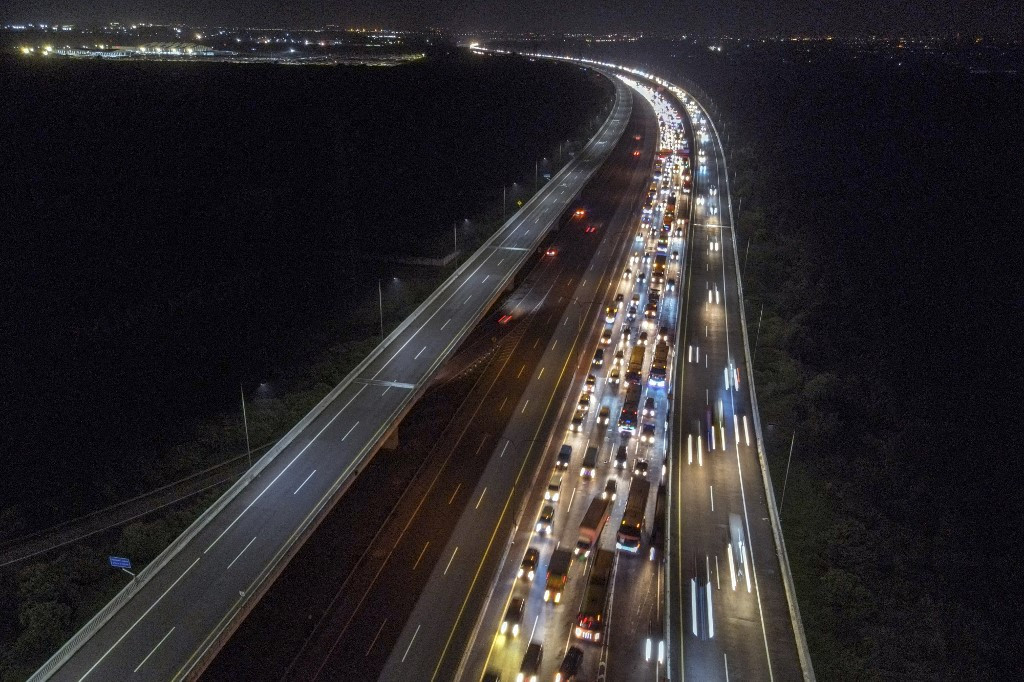Popular Reads
Top Results
Can't find what you're looking for?
View all search resultsPopular Reads
Top Results
Can't find what you're looking for?
View all search resultsGDP growth steady but inflation rising fast
CPI climbs to 3.47% in April, economic growth at 5.01% in Q1.
Change text size
Gift Premium Articles
to Anyone
S
tatistics Indonesia (BPS) reported on Monday that inflation had accelerated to a 33-month high in April and gross domestic product (GDP) growth steadied at 5 percent in the first quarter.
The consumer price index (CPI) was up 3.47 percent year-on-year (yoy) in April, the highest since August 2019, after some price controls were lifted and as domestic demand rose during the Ramadan-Idul Fitri period. Inflation was steeper than the 2.64 percent reported in March.
GDP rose by 5.01 percent yoy in the January-March period this year, marginally lower than the 5.02 percent recorded in the preceding quarter, amid higher exports and an increase in public mobility in response to eased COVID-19 restrictions.
The latest data casts inflation as a key risk to Indonesia’s post COVID-19 pandemic economic recovery, as high inflation might pummel purchasing power and prompt Bank Indonesia (BI) to tighten its monetary policy.
The April CPI is closing in on the upper limit of BI’s inflation target this year at 2 to 4 percent. BI has held its benchmark interest rate at a record low since February 2021.
“The strong first-quarter GDP reading and a rising inflation rate will be critical considerations for Bank Indonesia as it mulls monetary policy normalization,” wrote researchers at Moody’s Analytics on Monday.
“The March quarter’s GDP growth rate will provide some assurance that the economy is ready for a rate hike."
The April inflation exceeded many economists' estimates with polls conducted by Trading Economics expecting a 3.34 percent rate, Bloomberg 3.2 percent and Moody’s Analytics 3 percent.
BPS head Margo Yuwono said the food, beverage and tobacco segment posted the sharpest annual inflation at 5.20 percent after the government revoked price caps for packaged cooking oil.
The government introduced a palm oil export ban in late April, hoping to lower cooking oil prices to Rp 14,000 (96 US cents) per liter.
The transportation segment also posted a sharp increase at 4.84 percent annually, led by higher prices for gasoline and airline tickets.
In April, the government lifted price caps on non-subsidized Pertamax gasoline and on airline tickets to allow state-owned Pertamina and air carriers to accommodate higher global oil prices.
When asked about the impact of the recent value-added tax (VAT) hike on inflation, Margo said it did not affect the CPI much, contributing less than 0.01 percent.
Bank Mandiri economist Faisal Rachman said the new data had prompted the state-owned lender to raise its 2022 inflation forecast to 4.6 percent, compared to the initial forecast of 3.3 percent, “ruling in the possibility of more administered price adjustments”.
The government has signaled plans to raise the prices of Pertalite gasoline, 3-kilogram liquefied petroleum gas (LPG) canisters and electricity this year.
Bank Permata chief economist Josua Pardede said he expected inflation to cool down to between 3.4 and 3.5 percent next month as Pertamax prices and airline ticket prices begin normalizing. Inflation could be even lower if the government successfully lowers cooking oil prices.
However, the loosening of price controls on more energy commodities represented an upward risk to inflation, he acknowledged.
GDP growth
The latest GDP growth numbers fall within the upper end of Finance Ministry estimates at 4.5 percent to 5.2 percent yoy, and beat Moody's Analytics' prediction of 4.7 percent yoy.
"This quarter's mobility is the best since the pandemic began, as resident activities have exceeded normal conditions," said Margo.
Household spending rose by 4.34 percent yoy as reduced mobility restrictions paved the way for consumer spending in the tertiary sector, including tourism.
Gross fixed capital formation, or investment, rose 4.09 percent yoy. With the war between Russia and Ukraine driving up commodity prices, Indonesian imports and exports rose by 15 percent and 16 percent yoy, respectively.
However, government spending dropped 7.74 percent yoy as Indonesia cut back on COVID-19 relief programs, in line with an easing pandemic and fiscal consolidation plans.
"First quarter conditions were better than in 2019 because, back then, our trade balance was still negative, but now it is positive," Margo added.
The manufacturing sector grew 5 percent yoy as factory production started to pick up, in line with an improvement in the manufacturing Purchasing Managers' Index (PMI) in April.
Center of Economic and Law Studies (CELIOS) director Bhima Yudhistira said 5 percent GDP growth was not inevitable in the next quarter, as increasing interest rates would reduce demand for working capital loans and consumer loans.
Bank Mandiri analysts predict full-year economic growth of 5.17 percent assuming a further acceleration in economic activity with more robust household spending, but also underlined the risks of inflation.
"If the increase in inflation is not brought under control, there is a risk of decreasing purchasing power, which may weaken consumption to some extent," the analysts wrote.
Government responses
Finance Ministry Fiscal Policy Agency (BKF) head Febrio Kacaribu said high commodity prices and effective pandemic responses contributed to first quarter growth but also emphasized the risks of global economic developments on future growth.
“In anticipating future dynamics, the state budget will continue to be utilized as a ‘shock absorber’ to maintain economic recovery,” he said in a statement on Monday.
Coordinating Economic Affairs Minister Airlangga Hartarto said almost all business sectors showed positive signs, contributing to positive economic growth in the first quarter, supported by increased mobility ahead of Ramadan.
“The economic growth is also reflected by an increase in workforce absorption,” he said.
He added that the current inflation rate was within the state budget target, but also that President Joko “Jokowi” Widodo had asked his aides to remain wary of impending price surges.










